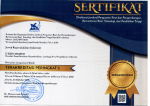RESISTENSI TERHADAP PRAKTIK DOMINASI KEKUASAAN DALAM INSTITUSI PENDIDIKAN USIA DINI: STUD I KAsus SEKOLAH 'AIZIF AH' DI YoGYAKARTA
Abstract
Preparation of human resources through education institutions have an important meaning, but the process would be tarnished if the educational institutions to be the arena of power domination. In this context, resistance has the same meaning as important, if the goal is to eliminate the practice of the domination of power that affectthe performance of stakeholders in school. The focus of this study are push factor the rise of resistance to the dominant of the subordinate, the process and intensity of resistance from stakeholders and the implications of the practice of domination for the school image. The focus of this study include triggers the rise of resistance to the dominant of the subordinate party, the process and intensity of resistance from stakeholders and the implications for the practice of dominance on the performance of education providers. This paper is based on the results of studies using qualitative approaches. Data collection methods, especially participant observation for 3 years. School boards unwillingness to accommodate the democratization, transparency and accountability in the school, and they even justify the structural and direct violence that triggered the practice of resistance led by the committee. Resistance not only from the committee, but also from the teachers and some school officials who have resigned. Resistance is a long process that starts from the emergence of collective consciousness the subordinate until to claim a vote of no confidence. Implications of long resistance is large enough, ie, declining student and imaging, the presence of structural violence or directly and it not conducive to learning process. Although in post-resistance the management of education is not fully accountability and transparency, but the relationships among stakeholders more conducive and imaging was started to improve at this school. In the future monitoring and management of education that is democratic and transparent is more important to aplicate the vision developed enterprise education charity.
Keyword: domination, resistance, democratization, human resources.
Keywords
Full Text:
PDFReferences
Adian, D. G. (2002). "Menabur Kuasa, Menuai Wacana". Basis, No. l-2, tahun 51, Januari-Februari 2002, Him. 42-49.
Alvesson, M. & Skolberg, K. (2000). Reflexive Methodology, New Vistas for Qualitative Research. Sage Publication, London-New Delhi.
Asy'arie, M. (2008). "Memecah Kebekuan Pendidikan dalam Gundukan Es Politik Kekuasaan". www.kompas. com/opini.
Barker, C. (2005). Cultural Studies, Teori dan Praktik. Yogyakarta: Kreasi Wacana.
Berger, P. L. & Luckmann, T. (1990). Tafsir Sosial atas Kenyataan: Risalah Tentang Sosiologi Pengetahuan. Jakarta: LP3ES.
Cabin, P. (2004). "Di Balik Panggung Dominasi: Sosiologi Ala Pierre Bourdieu". Dalam A. Giddens etc. Sosiologi Sejarah dan Perkembangannya. Yogyakarta: Kreasi Wacana.
Chamim, A. ibn. (2003). Civic Education, Pendidikan Kewarganegaraan, Menuju Kehidupan yang Demokratis dan Berkeadaban. Majelis Diktilitbang PP Muhamrnadiyah, LPPP UMY, The Asia Foundation.
Denzin, N. K. & Lincoln, Y. S. (Ed.). (1994). Handbook of Qualitative Research. Sage Publication, London-New Delhi.
Eriyanto. (2005). Analisis Wacana, Pengantar Ana/isis Teks Media. Cetakan 4. Yogyakarta: LKiS.
Fajar, A. M. (2008). "Filosofi Pendidikan Muhamrnadiyah". Suara Muhammadiyah. No. 19, Tahun 93. Him. 16.
Fisher, S. (2001). Mengelola Konflik: Keterampilan dan Strategi untuk Bertindak. Jakarta: The British Council-Responding to Conflict.
Foucault, M. (2002). Power/Knowledge (Wacana Kuasa/Pengetahuan). Terj. Yudi Santosa. Yogyakarta: Bentang Budaya.
Freire, P. & Fromm, E. (1999). Menggugat Pendidikan: Fundamentalis, Konservatif, Liberal dan Anarkis. Terj. Naomi. Yogyakarta: Pustaka Pelajar.
Freire, P. (2004). Politik Pendidikan: Kebudayaan, Kekuasaan dan Pembebasan. Penyunting Mas'ud. Yogyakarta: Pustaka Pelajar-READ.
Hanani, S. (2008). "Mengakhiri Hegemoni Kekuasaan di Ranah Pendidikan, Intropeksi Sejarah Pendidikan Bangsa Pasca Reformasi". www.setetesembun.or.id/
Hardiman, F. B. (2004). "Demokrasi Deliberatif: Model untuk Indonesia Pasca Soeharto". Majalah Basis. No. 11-12, November-Desember. Him. 14-22.
Haryatmoko. (2002). "Kekuasaan melahirkan anti-Kekuasaan: Menelanjangi Mekanisme dan Teknik Kekuasaan bersama Foucault". Basis, No. 1-2, tahun 51, Januari-Februari 2002. Him. 8-21.
Kleden, l. (2004). Sastra Indonesia dalam Enam Pertanyaan: Esai-esai Sastra dan Budaya. Jakarta: Pustaka Utama Grafiti.
"Mempertanyakan Akuntabilitas Dana Pendidikan, dan Memberantas Korupsi Mulai dari Sekolah". Kompas. 2005. 21 Mei. hlm. 42-41.
Magnis, S-F., (2001). Kuasa dan Moral. Cetakan Kelima. Jakarta: Gramedia Pustaka Utama.
Mulkhan, A. M. (1990). Warisan lntelektual KH. Ahmad Dahlan dan Amal Muhammadiyah. Yogyakarta: Persatuan.
Nashir, H. (2007). Meneguhkan ldiologi Gerakan Muhammadiyah. Cetakan Kedua. Malang: UMM Press, SM, MPK PP Muhazifah.
O'Neil, W. F. (2001). Idiologi-ldiologi Pendidikan. Yogyakarta: Pustaka Pelajar.
Prasetyo, E. & Bajraghosa, T. (2005). Pengumuman: Tidak ada Sekolah Murah. Yogyakarta: Resist Book.
Piliang, Y. A. (2005). Transpolitika: Dinamika Politik di Dalam Era Virtualitas. Yogyakarta: Jalasutra.
Ricoeur, P. (2006). Hermeneutika Ilmu Sosial. Yogyakarta: Kreasi Wacana.
Saefuddin, A. F. (2004) "Multicultural Education: Putting School First (a Lesson from the Education Autonomy Policy Implementation in Indonesia". Jurnal Antropologi UJ, 2004. page 97.
Sukarno, M., dkk. (2004). "Otonomi Daerah dan Pluralitas Lokal". Laporan Penelitian. Jakarta: Pusat Penelitian Politik LIP I.
Taqwa, M. R. (2009). "Menyoal Praktik Demokrasi dan Komersialisasi Pendidikan di Indonesia". Makalah Sim-Nas II Kerjasama FWI dan Prodi Kesejahteraan Sosial Fisip UI, 19-21 November di Kampus UI Depok.
Tilaar, H.A.R. (2003). Kekuasaan dan Pendidikan: Suatu Tinjauan dari Perspektif Studi Kultural. Magelang: Indonesiatera.
DOI: https://doi.org/10.14203/jki.v6i1.90
Copyright (c) 2016 Jurnal Kependudukan Indonesia

This work is licensed under a Creative Commons Attribution-NonCommercial-ShareAlike 4.0 International License.
-----------------------------------------------------------------------------------------------------------------------------
Research Center for Population, Indonesian Institute of Sciences
Widya Graha Building, 7th and 10th floors
Jl. Jenderal Gatot Subroto 10 Jakarta Selatan, Telp (021) 5221687
Website: http:/kependudukan.lipi.go.id;
E-Journal: http://ejurnal.kependudukan.lipi.go.id
Pustaka: http://pustaka.kependudukan.lipi.go.id
-----------------------------------------------------------------------------------------------------------------------------








